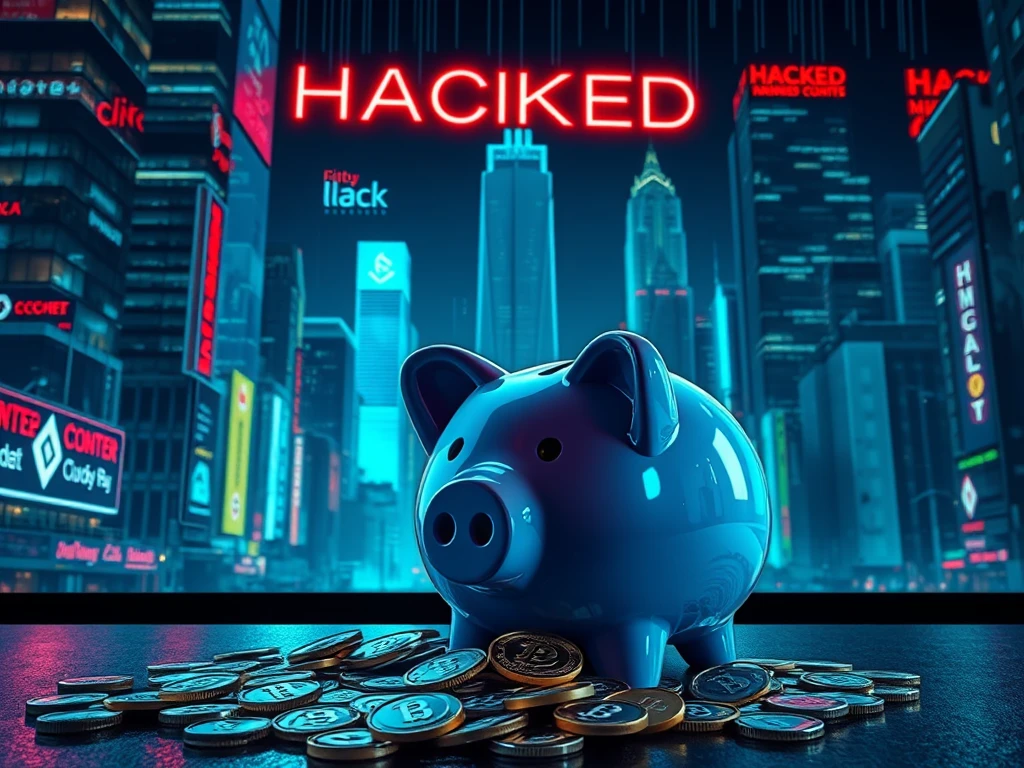Urgent Plea: SIR.trading Devastated by DeFi Hack, Begs Hacker for Stolen Funds Return

In a dramatic turn of events in the decentralized finance (DeFi) space, SIR.trading, a relatively new DeFi protocol, has become the latest victim of a significant crypto hack. Just a day after a staggering $355,000 was pilfered from their platform, the protocol’s founder has issued a desperate public plea to the hacker. The founder is begging for the return of a substantial portion of the stolen funds, emphasizing that the protocol’s very survival hangs in the balance. This incident highlights the ever-present risks in the crypto world and the devastating impact such attacks can have, especially on smaller, emerging projects.
Desperate Plea After Crippling DeFi Hack
The pseudonymous founder of SIR.trading, known as “Xatarrer,” has made an emotional appeal directly to the attacker. In an on-chain message, Xatarrer proposed a deal: the hacker could keep $100,000 as a ‘fair share’ for identifying the vulnerability, while the remaining funds, approximately $255,000, should be returned. “We’ll call it even. No legal games, no drama,” Xatarrer stated, hoping to incentivize the hacker through goodwill and the promise of no repercussions. This crypto hack has not only shaken the SIR.trading community but also serves as a stark reminder of the vulnerabilities that can exist even in protocols built with the intention of enhanced security.
SIR.trading’s Survival at Stake: The Impact of Stolen Funds
Xatarrer’s plea underscores the dire situation SIR.trading faces. He explained that the protocol was built from the ground up over four years of dedicated coding, fueled by $70,000 of personal investment from friends and believers. Notably, SIR.trading achieved a Total Value Locked (TVL) of $400,000 organically, without any marketing expenditure or venture capital backing. This makes the $355,000 in stolen funds an existential threat. “If you keep 100% of the funds, there is no chance for us to survive,” Xatarrer lamented, painting a clear picture of the protocol’s precarious position. The loss of these funds is not just a financial setback; it jeopardizes the future of the entire project and the trust of its users.
A Sophisticated Exploit Leveraging Ethereum Dencun Upgrade
Adding a layer of complexity to this DeFi hack is the nature of the exploit itself. Xatarrer, in a somewhat backhanded compliment, described the hack as “almost beautiful.” The attacker targeted a callback function within SIR.trading’s “vulnerable contract Vault.” This contract utilized Ethereum’s transient storage feature, a component introduced in the recent Ethereum Dencun upgrade. The vulnerability lay in the ability of the hacker to manipulate the Uniswap pool address used in this callback function. By replacing the legitimate address with one under their control, the hacker effectively redirected funds from the vault to their own address. This was achieved by repeatedly calling the callback function until the protocol’s entire TVL was drained. The Ethereum Dencun upgrade, intended to reduce gas fees, inadvertently opened a new attack vector that was skillfully exploited in this instance.
Hacker’s Next Steps and Lack of Response
As of now, the hacker has remained silent and unresponsive to SIR.trading’s plea. Data from Etherscan, the Ethereum block explorer, reveals that the stolen funds have already been moved through Railgun, an Ethereum privacy solution. This move suggests an attempt to obfuscate the funds’ trail, making recovery even more challenging. Despite the setback, the SIR.trading team initially expressed their determination to continue operating. They assured their community that those affected by the DeFi hack would not be forgotten and that plans for recovery were underway. However, the founder’s desperate plea highlights the severity of the situation and the uphill battle they now face.
Lessons Learned and the Broader Crypto Security Landscape
This incident with SIR.trading underscores several critical points within the cryptocurrency and DeFi space:
- Emerging Tech Risks: Even well-intentioned upgrades like Ethereum Dencun can introduce unforeseen vulnerabilities. Thorough security audits and rigorous testing are paramount, especially when incorporating new features.
- DeFi Security is Paramount: The decentralized nature of DeFi doesn’t inherently guarantee security. Protocols must prioritize robust security measures to protect user funds and maintain trust.
- Impact on Smaller Projects: For smaller DeFi protocols like SIR.trading, a hack of this magnitude can be catastrophic, potentially leading to project failure.
- Hacker Negotiations: The plea from SIR.trading raises ethical questions about negotiating with hackers. While controversial, it may be a pragmatic approach for fund recovery in desperate situations.
Interestingly, recent data from CertiK indicates a 40% decrease in DeFi hacks in March 2024. However, this positive trend is overshadowed by the surge in CeFi (Centralized Finance) breaches, which reached a staggering $694 million. The overall crypto landscape remains vulnerable, and incidents like the SIR.trading DeFi hack serve as a crucial reminder of the ongoing need for vigilance and enhanced security protocols across the entire crypto ecosystem.
Conclusion: A Stark Reminder of Crypto’s Wild West
The desperate plea from SIR.trading’s founder is a poignant illustration of the high-stakes nature of the cryptocurrency world. The crypto hack and subsequent plea for the return of stolen funds highlight the vulnerabilities that persist even with technological advancements like the Ethereum Dencun upgrade. As the crypto space continues to evolve, security must remain at the forefront of development and operations. The fate of SIR.trading now hangs in the balance, a stark reminder of the risks and the potential for both innovation and devastation in the decentralized world of cryptocurrency.










